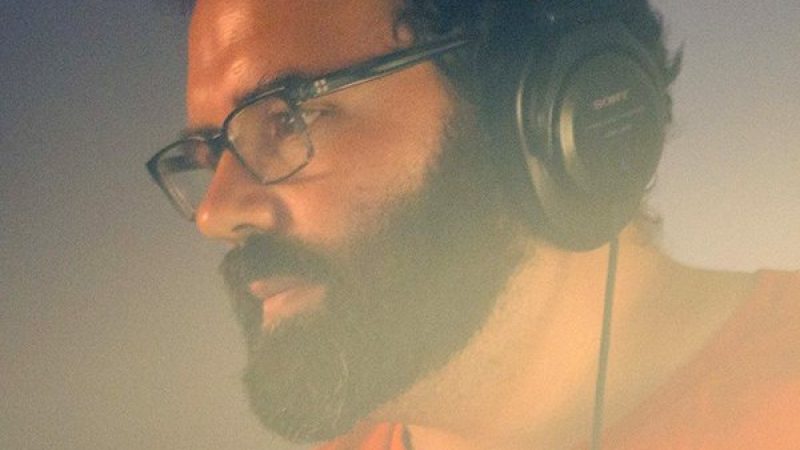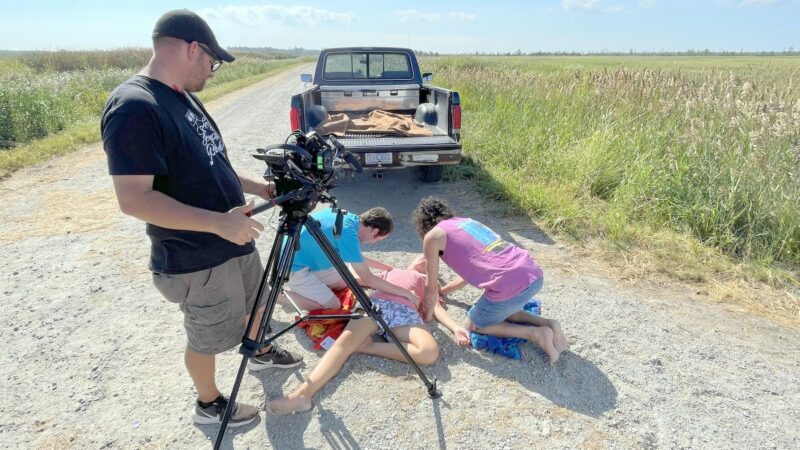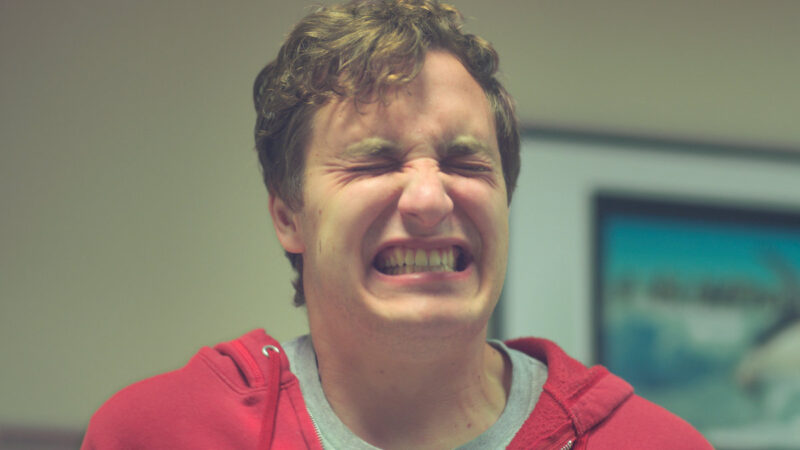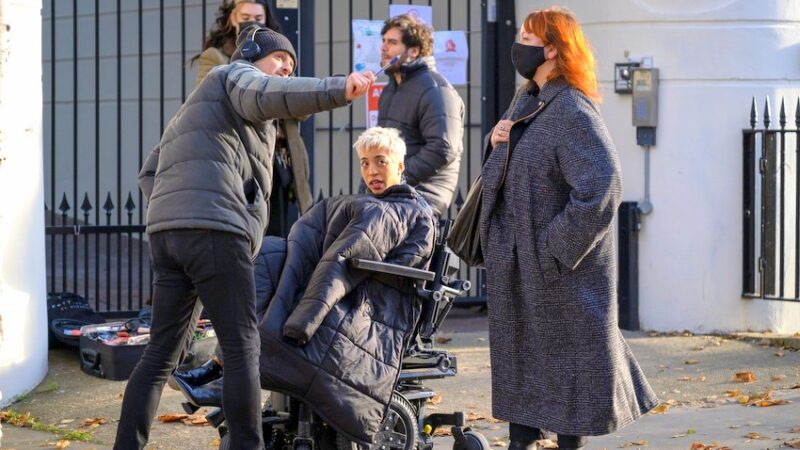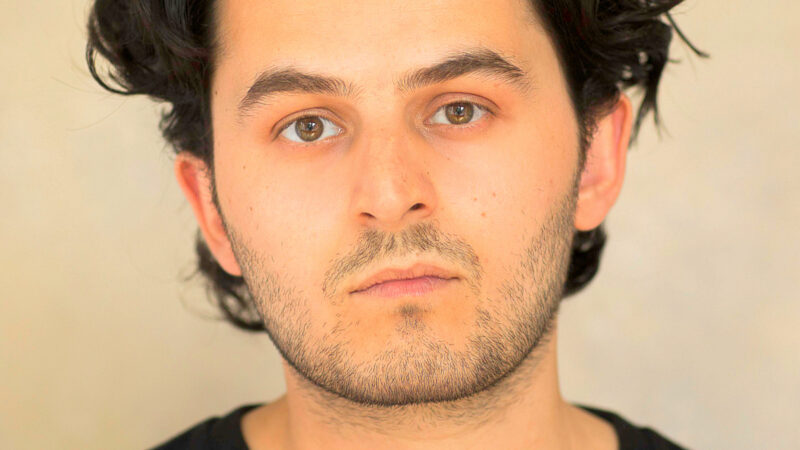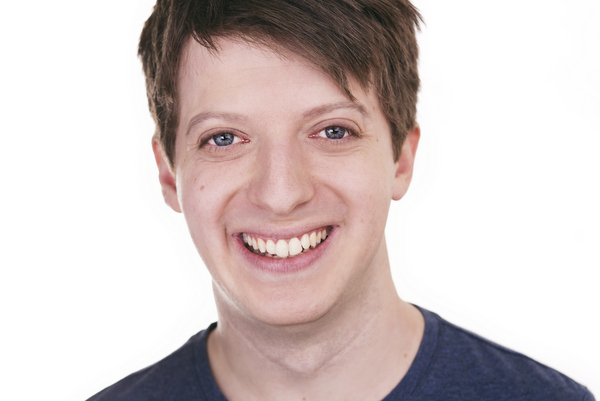
At a very young age Alex Sapozhnik did what all kids do, make believe. Alex’s parents divorced when he was very young, and Alex had a tough time growing up. Like all children though, Alex was very intuitive, imaginative—a dreamer. Alex felt sadness in both his mother and father, so he spent a great amount of his time trying to make them happy—creating his own TV shows, stand up routines, and his own stories using homemade props. Alex Sapozhnik spent almost all his time playing his fully immersive “make believe” with a close girl friend of his. Until they hit the age of 13 and she realized she’s a grown up and alex just wanted to keep playing. So his mom sent him to The Brooklyn Conservatory of Music to study music and theater. Alex was the shyest of them all. It was in those 2 years, Alex realized this is what he wanted to do. Alex just didn’t know this was something he could actually pursue and not just make into a game.
From the set of The Uncle Gerry Show pilot. Oh man, that mustache is long gone now. Photo by Alison Drew Balletta. pic.twitter.com/dVATWNQDD2
— Alex Sapozhnik (@AlexSapozhnik) October 26, 2016
What moment in your history caused you to decide to be a filmmaker?
Thanks to my parents, I was exposed to a lot of films. I re-watched many films from Russia, France, Italy, India and of course the U.S. Charlie Chaplin was my oldest memory—and who better to learn the craft of acting from than someone who can do it without speaking? I was first incredibly inspired by Charlie Chaplin, Jim Carrey, Paul Reubens, Danny Devito, and Ron Perlman. European actors: Pierre Richard, Adriano Celentano, Louis de Funes, the list keeps going. My dad is an artist, he always encouraged me to do what I love and be creative. My mom has done mime work in the past, was always brilliant and excelled in studies, and she is a great writer/poet. After doing high school theater and studying some theater in college I wanted to get some serious training. Thanks to my good friend Eddie Wong, I found The William Esper Studio. I sort of owe Eddie Wong a lot my performance career life I feel. He’s a great friend for many years, tremendously talented and funny. The training at Esper changed my life, my acting, and my view of the craft completely. It was the most important thing I ever did for my acting career. Of course, being with my girlfriend Alana has also taught me many things and consistently inspired me, so I’m grateful for her support.
What is your filmmaking process?
Studying at The William Esper Studio first exposed me to the Meisner Technique. Though I’ve read about a lot of techniques: Sanford Meisner, Constantin Stanislavsky, Lee Strasberg, Stella Adler, Michael Chekoff (all incredible)—I never dove deep into one of them until this one. From the first week of classes I just knew this was the one for me. The concept of “living truthfully under imaginary circumstances” simply made sense to me. A technique where I can be myself and also the action of the play is really happening to me. You’re connected to the other actor/actress, you’re truthfully reacting and really taking in what’s happening to them and letting it happen to you. You’re living through this right now, from moment to moment—its really happening to you. Every scene I’m doing something, I’m trying to achieve something. By the time I got to the character work, I was even more ecstatic.
Another shot from when I did The Life and Death of King John. Photo by Amy Sims Photography. #acting #Shakespeare pic.twitter.com/SRpn3FXBby
— Alex Sapozhnik (@AlexSapozhnik) May 6, 2016
Tell us about the work you have produced
I just completed my first TV pilot that I had a principal role in, The Uncle Gerry Show. The series is about a live talk show in 1978 hosted by Gerry Rocco played by the hilarious and talented Peter Ferriero. It is directed by Clarke Mayer, and its such an amazing crew and cast. It was a thrilling ride, and I know it isn’t over. I got to play the role of Joey, the overconfident but goofy lackey. Working on the same set as Tony Darrow (Goodfellas), Vincent Pastore (Sopranos), Joseph D’Onofrio (Bronx Tale/Back in the Day), and Paul Borghese (Back in Day/The Family) was beyond unreal. Playing alongside Samantha Ivers (Inside Man) was a phenomenal experience and she’s an amazingly versatile actress. This set truly taught me to relax, let go, give in, and let all my prep have a ride. I’ve been doing quite a few plays, but Film and TV mediums have their own magic and abilities. Theater will always be my favorite acting challenge; it’s the best place to really be immersed. You can’t cut, you can’t stop, and you’re living through the two hours of your characters life, all live in front of an audience that’s ready to throw some delicious tomatoes at you. I love film, television, and theater and I would love to continue all of them interchangeably. There are minor adjustments for all three, but I always try to remember, acting is acting. If I’m truly related to it, connected, working off my acting partner, letting things happen to me, limping ‘cause my character has a bad leg—then I’m acting. I resent when I hear anyone say “acting is lying”. If you’re lying, you’re not really immersed in the action of the play.
Do you take courses to improve your craft
I constantly work on my speech, accents, movement, and whatever I feel I’m rusty with to keep it all fresh. Dancing. Whenever I feel I need it, or feel like I’m losing touch, I’ll coach with a private acting coach. The great thing is there is a coach for anything and everything you need. I find it most comforting to coach with an acting coach from the studio itself. I always learn something new, something I might not see in the script myself.
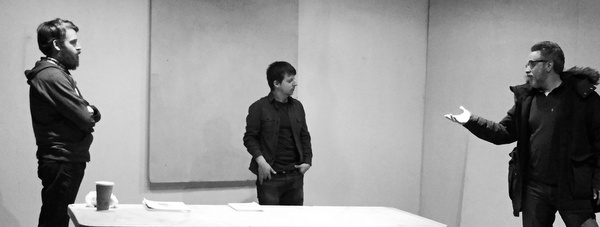
How do you combine acting and writing
Being an actor has improved my writing. I can confidently say I don’t have a problem with dialogue. I simply put myself in every character’s shoes, imagine myself there in the moment, and think to myself, “what would I do right now. What would I say as this person? With this point of view” I simply react to myself, and the dialogue flows. I’m always challenged when it comes to plot though, so I try to outline the whole thing before I start the scenes.
How did you get into the film business
After I graduated Esper, I found out all the ways to submit for acting work. Actors Access, Backstage, Casting Networks, networking studios, all the articles, the do’s and don’ts.
How do you turn an idea into a screenplay
I look at an idea I have, for example, “A world where everyone is one ethnic background, one race, one height etc.” And then I think about what would be a good conflict? What would be a problem for these people? Or what would be great for them? Then I come up with a character that is the hero, or anti-hero. A character that is going against all odds or needs a change. I think that’s a story right there we just wrote, right?
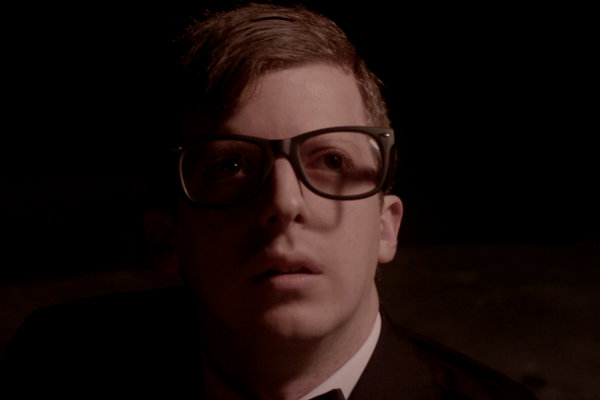
Explain your writing process
I try to write about what I’m concerned about, though oftentimes I find myself going into darker topics (not a bad thing). But either way, I find what I like to write about it. I make it really simple. Two characters, a table, two chairs. And I come up with why they’re there, what’s going on between them, how well do they know each other. I go from there, usually incorporating my idea. I find that, the simpler the setup, the easier it is for me to develop my story—because I can always change the setting its what’s happening that’s important.
What writing tip or idea can you give young writers
Simplify. Concentrate on your characters and their development. Whether your story is a sci fi, romantic comedy, horror, mystery, action—it’s always going to be more interesting when your characters have an arc, a change, or a lot going on emotionally.
What do you want to change about the film business
Oh man, there are a few things. The major thing that comes to mind right now is money to fund films. There are amazing, incredibly amazing directors out there who don’t have funding from the film industry for really fantastic films. Why? Simply because the industry knows they won’t make more money on their film. There are many remarkable films that don’t surface because there’s not enough money. And these aren’t small films or small directors. I love superhero movies too, but I don’t think all the money should be going into them.
What do you want to be remembered for
I want to be remembered for making people happy and for creating many interesting and memorable characters. Be so immersed they forget its Actor Alex. And to also make people go “How did he do that?!” In an ideal world, I’d like to completely eradicate hate, spread love, and bring people of all different backgrounds together. I hope I can contribute to moving us humans forward in the real world, and uniting us as much as possible if not completely. I hope to help our children start thinking for themselves, expand their knowledge and love for science, art, and moral values. I can keep going, I have many dreams. I’m inspired now, thank you for asking that!
Website | Facebook | Twitter | Vimeo | IMDB | Instagram | LinkedIn
INTERVIEWS
In Conversation with Michael Oblowitz Director of Confidential Informant
Confidential Informant stars Mel Gibson, Dominic Purcell, and Kate Bosworth
more interviews

